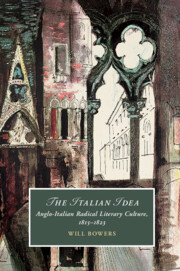
-
Select format
-
- Publisher:
- Cambridge University Press
- Publication date:
- 19 December 2019
- 02 January 2020
- ISBN:
- 9781108590228
- 9781108491969
- 9781108741378
- Dimensions:
- (228 x 152 mm)
- Weight & Pages:
- 0.56kg, 296 Pages
- Dimensions:
- (229 x 152 mm)
- Weight & Pages:
- 0.434kg, 298 Pages
- Subjects:
- Literature, Area Studies, European Literature, European Studies, English Literature 1700-1830
- Series:
- Cambridge Studies in Romanticism (128)
You may already have access via personal or institutional login- Subjects:
- Literature, Area Studies, European Literature, European Studies, English Literature 1700-1830
- Series:
- Cambridge Studies in Romanticism (128)
Book description
From 1815 to 1823 the Italian influence on English literature was at its zenith. While English tourists flocked to Italy, a pervasive Italianism coloured many facets of London life, including poetry, periodicals, translation, and even the Queen's trial of 1820. In this engaging study Will Bowers considers this radical interaction by pursuing two interrelated analyses. The first examines the Italian literary and political ideas absorbed by Romantic poets, particularly Lord Byron, Leigh Hunt, and Percy Bysshe Shelley. The second uncovers the ambassadorial role played in London by Italians, such as Serafino Buonaiuti and Ugo Foscolo, who promoted a revolutionary idea of their homeland and its literature, particularly Dante's Commedia. This dual-perspective study reveals the cosmopolitan challenge to Regency mores embodied in both the work of Italian literary exiles in London and the English poetic engagement with Italy.
Awards
Short-listed, 2021 First Book Prize, British Association for Romantic Studies
Winner, The 2022 ESSE Book Award for Junior Scholars for a book in the field of Cultural and Areas Studies in English, The European Society for the Study of English
Reviews
‘As an ambitious and challenging reflection on the wider implications of the Anglo-Italian cultural interaction in the early nineteenth century, The Italian Idea makes a significant contribution to the field of Anglo-Italian studies and literary history. It exemplifies a new kind of intellectual and political awareness - more trans-European and less national - of the radical writers of the time. But the real strength of this study lies in the range of Bowers' erudition.’
Maria Schoina Source: Review 19
‘The volume is clearly structured, each chapter is introduced by a short introductory overview and written in a captivating style … The conclusion leaves the reader feeling that the author could provide a continuation to this impressive and learned study …’
Antonella Braida Source: The Review of English Studies
‘A hugely significant contribution to scholarship in this area, The Italian Idea sketches a variegated map, valuable both for the broader directions of travel it indicates and for the insights into seemingly accessory features … A rewardingly rich and continuously stimulating read, Bowers’s The Italian Idea invites us to plunge into a short and fervid cultural-ideological phase in order to recover the full extent of one of the most distinctive facets of Italia romantica in British culture of the Romantic age.’
Diego Saglia Source: Modern Philology
‘This meticulous survey carefully contextualizes second-generation British Romantic writers' texts … proving that a study of Anglo-Italian cross-currents provides additional insights … One of this study's great strengths is the wealth of diverse material Bowers welds together, combining reflections on authors' influence; rhyme schemes; sub-genres such as romance, the satirical mode, history, translation; mediator figures; and even advertising (in Beppo) to add new angles of analysis.’
Susanne Schmid Source: The BARS Review
‘Rather than a hot-chronology, or a snapshot, Bowers offers the reader what I like to think of as an impressive diorama of English and Italian engagement. The pieces move in unanticipated and previously unapprehended ways, there are hidden corners and strange shadows, and we know that it is selective, but that is why it works. It is a rare thing to discover such a learned and gracefully written book as this.’
Bysshe Inigo Coffey Source: The Wordsworth Circle
'The Italian Idea offers a fine contribution to the strong and durable critical interest in Anglo-Italian relations during the period. Particularly effective is Bowers's telescoping mode of inquiry, one that allows him to move nimbly between insightful close readings of individual works and a contextual regard for the complex ways that these works are warmed by the fading revolutionary coals of the post-Waterloo years.'
John Bugg Source: Keats-Shelley Journal
Contents
Metrics
Altmetric attention score
Full text views
Full text views help Loading metrics...
Loading metrics...
* Views captured on Cambridge Core between #date#. This data will be updated every 24 hours.
Usage data cannot currently be displayed.
Accessibility standard: Unknown
Why this information is here
This section outlines the accessibility features of this content - including support for screen readers, full keyboard navigation and high-contrast display options. This may not be relevant for you.
Accessibility Information
Accessibility compliance for the PDF of this book is currently unknown and may be updated in the future.


